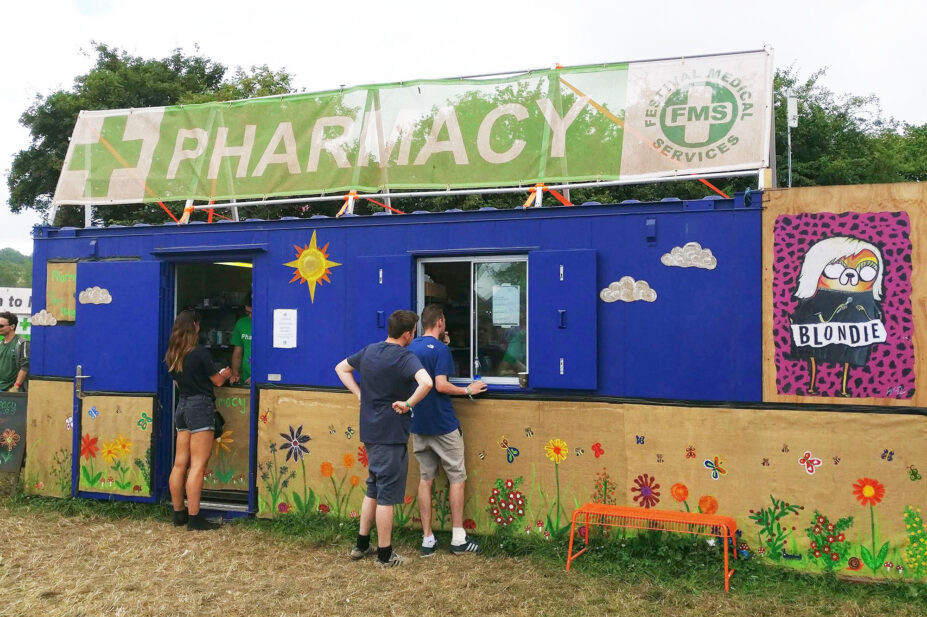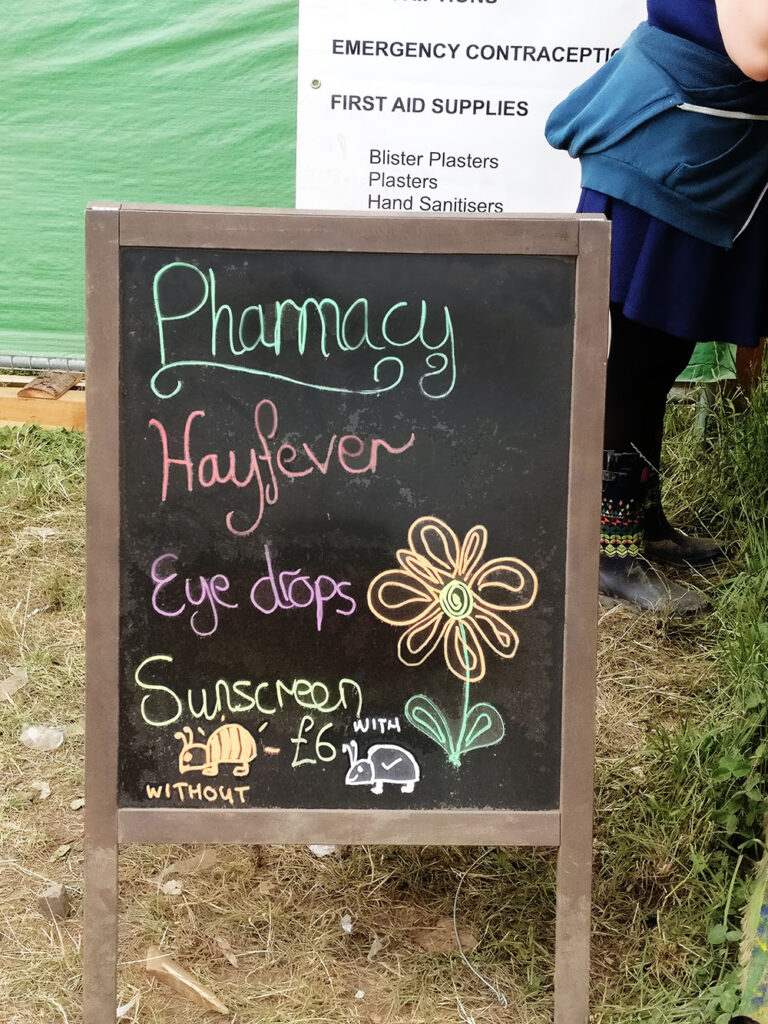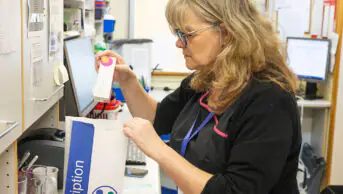
Adele Cameron
Working in a festival pharmacy offers a unique, dynamic experience that differs from traditional community or hospital pharmacy roles. Pharmacists provide essential care and take on a range of duties that blend conventional pharmaceutical practice with the fast-paced demands of a bustling, large-scale outdoor event.
At events such as Glastonbury or Reading festivals, the charity Festival Medical Services — run entirely by volunteers — provides comprehensive medical services and care to keep attendees safe. As a volunteer pharmacist, your day starts not with a commute, but by emerging from a tent, donning a wristband and maybe swapping wellies for sandals — depending on the weather. The setting may be unconventional, but the work itself and the pharmacy set-up are surprisingly familiar once you arrive.
The pharmacy set-up
Situated within the festival’s medical area, the main pharmacy is usually a mobile cabin, with windows set up as serving hatches for festival goers. An empty shell is transformed into a fully functional, well-stocked dispensary, thanks to a team of dedicated volunteers who set up computers, fridges, a till and ensure compliance with legal requirements.
The medical centre functions as a field hospital throughout the festival and is open 24/7
This follows months of planning: recruiting volunteers; coordinating training; preparing rotas; ordering stock; updating standard operating procedures; and liaising with the wider medical team and the festival organisers.
The medical centre functions as a field hospital throughout the festival and is open 24/7, along with the pharmacy. It operates as a hybrid between a hospital and a community pharmacy. The collaboration with other on-site healthcare professionals — such as doctors, nurses, dentists and more – is crucial for providing comprehensive care to festival goers.
There is often a second pharmacy within the busier public areas of the festival to provide essentials, such as blister plasters and pain relief, helping to ease pressure on medical services.

Evolving role of pharmacists at festivals
Pharmacists working at festivals bring a unique blend of clinical care, logistical problem-solving and public health support. The role centres on providing direct patient care — advising on and supplying over-the-counter medications, dispensing on-site prescriptions and ensuring safe medication use. Independent prescribers may initiate treatment within their scope of practice, helping to manage minor conditions and easing pressure on busy medical teams.
Tailored medication counselling is especially important in this atypical environment, where patients are living in tents, dealing with unpredictable weather and may have limited access to their usual routines. A non-judgmental attitude is essential. Unsurprisingly, emergency contraception and ‘missed-pill advice’ is high on our personal CPD plans ahead of each festival.
Pharmacists also play an essential role in multidisciplinary care — offering prescribing advice, interpreting formularies and liaising directly with prescribers. This close access to the medical team enables timely, appropriate treatment decisions, particularly when non-formulary or patient-specific options are required — all in a high-demand, fast-paced setting.
The pharmacies stock a wide range of festival essentials, including sunscreen, sanitary products and more, supporting wider health and wellbeing
Working in a remote field also brings distinct logistical challenges. A significant part of the role involves sourcing forgotten essentials for festival goers — such as inhalers, insulin or colostomy supplies — along with managing stock, dealing with IT challenges, coordinating deliveries, obtaining site passes for wholesalers and preparing for inspections from both pharmacy regulators and the police.
At Glastonbury 2025, a fridge failure compromised patients’ own medications stored on-site. With items ranging from insulin to a variety of biologicals, there was a rapid information hunt to ensure appropriate advice on the use and future stability of these items to ensure patients could still be safely treated during the event.
Other pharmacy services
In addition to medicines, the pharmacies stock a wide range of festival essentials, including sunscreen, sanitary products and more, supporting wider health and wellbeing. Shifts often include serving as information hubs, fielding questions on site navigation, lost property, welfare services and often discussing what bands have just been on and where to find the best food.
Pharmacy volunteers typically work two eight-hour shifts during the festival. Once your shift ends, you’re free to explore the festival, but it is important to maintain professional conduct, both during and after your shift, as you represent both the pharmacy and medical teams on site.
Overall, festival goers are very grateful for our services, and the experience highlights the versatility of the role of pharmacists and the essential care we provide — no matter the setting.
Working in a festival pharmacy is both rewarding and challenging. It requires flexibility, a proactive approach to problem-solving and a collaborative spirit. Whether dispensing medications, providing advice, or navigating the unique, busy environment, festival pharmacists play a vital role in ensuring the health and wellbeing of all attendees.
Before you know it, you’ll be signing up for the following year.
Adele Cameron is a community pharmacist in Ross-shire, Scotland
2 comments
You must be logged in to post a comment.



Very interesting article, great to see pharmacy operating in this area.
Fascinating, i had wondered about the pop up medical tents and such in festivals and the potential role community pharmacy could play